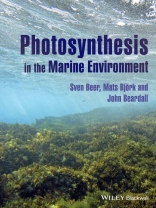‘Marine photosynthesis provides for at least half of the primary
production worldwide…’
Photosynthesis in the Marine Environment constitutes a
comprehensive explanation of photosynthetic processes as related to
the special environment in which marine plants live. The first part
of the book introduces the different photosynthesising organisms of
the various marine habitats: the phytoplankton (both cyanobacteria
and eukaryotes) in open waters, and macroalgae, marine angiosperms
and photosymbiont-containing invertebrates in those benthic
environments where there is enough light for photosynthesis to
support growth, and describes how these organisms evolved. The
special properties of seawater for sustaining primary production
are then considered, and the two main differences between
terrestrial and marine environments in supporting
photosynthesis and plant growth are examined, namely irradiance and
inorganic carbon. The second part of the book outlines the general
mechanisms of photosynthesis, and then points towards the
differences in light-capturing and carbon acquisition between
terrestrial and marine plants. This is followed by discussing the
need for a CO2 concentrating mechanism in most of the
latter, and a description of how such mechanisms function in
different marine plants. Part three deals with the various ways in
which photosynthesis can be measured for marine plants, with an
emphasis on novel in situ measurements, including
discussions of the extent to which such measurements can serve as a
proxy for plant growth and productivity. The final chapters of the
book are devoted to ecological aspects of marine plant
photosynthesis and growth, including predictions for the future.
Mục lục
About the authors ix
Preface xi
About the companion website xiii
Part I Plants and the Oceans 1
Introduction 1
Chapter 1 The evolution of photosynthetic organisms in the oceans 5
Chapter 2 The different groups of marine plants 15
2.1 Cyanobacteria 16
2.2 Eukaryotic microalgae 17
2.3 Photosymbionts 23
2.4 Macroalgae 27
2.5 Seagrasses 34
Chapter 3 Seawater as a medium for photosynthesis and plant growth 39
3.1 Light 40
3.2 Inorganic carbon 45
3.3 Other abiotic factors 52
Summary notes of Part I 55
Part II Mechanisms of Photosynthesis, and Carbon Acquisition in Marine Plants 57
Introduction to Part II 57
Chapter 4 Harvesting of light in marine plants: The photosynthetic pigments 61
4.1 Chlorophylls 61
4.2 Carotenoids 63
4.3 Phycobilins 64
Chapter 5 Light reactions 67
5.1 Photochemistry: excitation, de-excitation, energy transfer and primary electron transfer 67
5.2 Electron transport 74
5.3 ATP formation 76
5.4 Alternative pathways of electron flow 77
Chapter 6 Photosynthetic CO2-fixation and -reduction 81
6.1 The Calvin cycle 81
6.2 CO2-concentrating mechanisms 89
Chapter 7 Acquisition of carbon in marine plants 95
7.1 Cyanobacteria and microalgae 96
7.2 Photosymbionts 101
7.3 Macroalgae 104
7.4 Seagrasses 118
7.5 Calcification and photosynthesis 122
Summary notes of Part II 124
Part III Quantitative Measurements, and Ecological Aspects, of Marine Photosynthesis 127
Introduction to Part III 127
Chapter 8 Quantitative measurements 129
8.1 Gas exchange 131
8.2 How to measure gas exchange 133
8.3 Pulse amplitude modulated (PAM) fluorometry 137
8.4 How to measure PAM fluorescence 142
8.5 What method to use: Strengths and limitations 146
Chapter 9 Photosynthetic responses, acclimations and adaptations to light 157
9.1 Responses of high- and low-light plants to irradiance 157
9.2 Light responses of cyanobacteria and microalgae 163
9.3 Light effects on photosymbionts 164
9.4 Adaptations of carbon acquisition mechanisms to light 169
9.5 Acclimations of seagrasses to high and low irradiances 169
Chapter 10 Photosynthetic acclimations and adaptations to stress in the intertidal 175
10.1 Adaptations of macrophytes to desiccation 175
10.2 Other stresses in the intertidal 181
Chapter 11 How some marine plants modify the environment for other organisms 183
11.1 Epiphytes and other ‘thieves’ 183
11.2 Ulva can generate its own empires 185
11.3 Seagrasses can alter environments for macroalgae and vice versa 187
11.4 Cyanobacteria and eukaryotic microalgae 189
Chapter 12 Future perspectives on marine photosynthesis 191
12.1 ‘Harvesting’ marine plant photosynthesis 191
12.2 Predictions for the future 192
12.3 Scaling of photosynthesis towards community and ecosystem production 194
Summary notes of Part III 197
References 199
Index 203
Giới thiệu về tác giả
Sven Beer, Professor of Marine Botany, Tel Aviv University, Department of Plant Sciences, Faculty of Life Sciences, Tel Aviv University, Tel Aviv, Israel.
Mats Björk, Botany Department, Stockholm University, Stockholm, Sweden.
John Beardall, School of Biological Sciences, Monash University, Australia.












